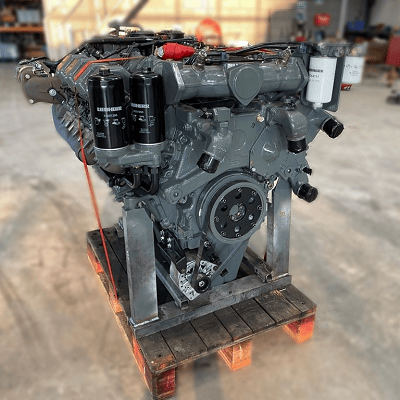The process of a dyno test on a Liebherr engine

When it comes to heavy machinery, reliability and power are paramount. Liebherr, a name synonymous with innovation and excellence in engineering, stands tall as a pioneer in the realm of heavy equipment and machinery. From towering cranes to robust excavators, Liebherr’s engineering prowess extends to the heart of these machines. We delve into the world of dyno testing a Liebherr engine, uncovering the meticulous process behind unleashing the raw power concealed within.
The foundation of excellence
Before we embark on the journey of dyno testing, it’s crucial to understand the foundation upon which Liebherr engines are built. With decades of engineering expertise and commitment to quality, Liebherr engines are crafted to withstand the most demanding environment and deliver unparalleled performance. Each component is meticulously designed and rigorously tested to ensure reliability, efficiency and longevity.
The process
1 Preparation: The engine undergoes meticulous preparation before being mounted onto the dynamo meter. This includes ensuring all connections are secure, fluids are filled to the appropriate levels, and sensors are properly calibrated.
2 Mounting: The engine is carefully mounted onto the dynamometer, a specialized device designed to simulate real-world operating conditions. Precision is paramount during this step to ensure accurate results.
3 Initial checks: Once mounted, a series of initial checks are conducted to verify proper alignment, connection integrity, and functionality of all engine systems.
4 Warm-up: The engine is started and allowed to warm up to operating temperature. This ensures consistent results and minimizes the risk of damage during testing.
5 Baseline testing: With the engine warmed up , baseline tests are conducted to establish initial performance metrics. This includes measuring power output, torque, fuel consumption, and emissions at various RPM levels.
6 Load testing: The engine is subjected to progressively increasing loads to simulate different operating conditions, such as idle, partial load and full load. This allows engineers to assess performance across the entire operating range and identify any potential issues or optimization.
7 Data analysis: Throughout the testing process, data is continuously collected and analyzed in real-time. Advanced instrumentation and software are used to monitor performance metrics and identify trends or anomalies.
8 Optimazation: Based on the data analysis, adjustments may be made to optimize engine performance. This could involve fine-tuning fuel injection timing, adjusting air-fuel ratios, or optimize turbocharger boost pressure.
9 Validation: Once testing is complete, the results are meticulously reviewed and validated against predetermined criteria and specifications. Any deviations or anomalies are thoroughly investigated to ensure accuracy and reliability.
10 Reporting: Finally, a comprehensive report is generated detailing the results of the dyno testing, including performance metrics, observations, and any recommendations for further optimization or refinement.
The outcome of dyno testing
Dyno testing a Liebherr engine is more than just a routine procedure – it’s a testament to the unwavering commitment to excellence that defines Liebherr’s engineering philosophy. By subjecting their engines to rigorous testing and analysis, Liebherr ensures that each engine delivers the uncompromising performance, reliability, and efficiency that customers expect.
In conclusion, dyno testing a Liebherr engine is not just about measuring power output. It’s about unlocking the true potential of these remarkable engines and ensuring they exceed expectations in the most challenging environments imaginable.
NINGBO RUICAN MACHINERY COMPANY more than 15 years of experience in high pressure Die Casting for aluminum & zinc, Investment Casting, for alloy, carbon steel, stainless steel, ductile iron & grey iron Sand Casting, as well as precision machines and also tool & fixture.
NINGBO RUICAN MACHINERY COMPANY has been registered with ISO9001:2015 system to be sure the quality as OEM/ODM supplier. Sister company with ISO/TS16949 certified to supply high quality automotive components Will keep a high standard for a valued added service to its international customers.
NINGBO RUICAN MACHINERY COMPANY produces various Engineering Machinery Parts according to the clients' technical drawings or samples.Various materials can be used,such as grey iron,ductile iron,carbon steel,steel alloy,stainless steel,aluminium,brass and so on.
NINGBO RUICAN MACHINERY COMPANY has established a good and long business relationships with many good clients,such as IBCC,ITR,CAF,JCB,GETT,DYG,FLEX-N-GATE,and so on.
Engineering Precision Machinery Parts,Flange Engineering Machine Parts,Precision Engineering Machinery Parts,Grinding Engineering Machinery Parts
Ningbo City Yinzhou Ruican Machinery Co.,Ltd , https://www.cnruican.com
